#genre: biographical
Text
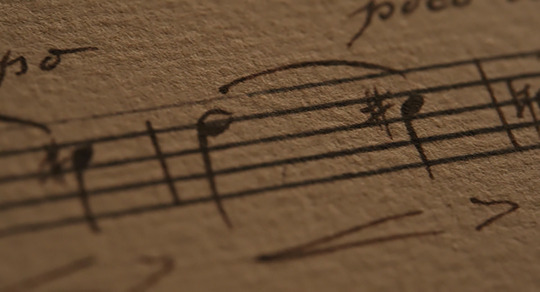

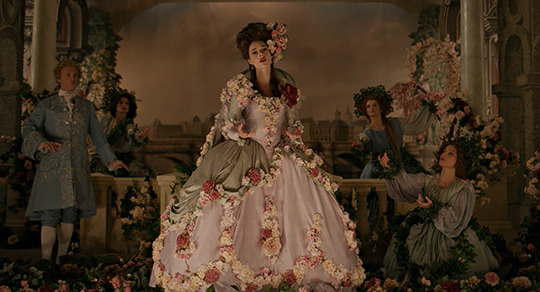
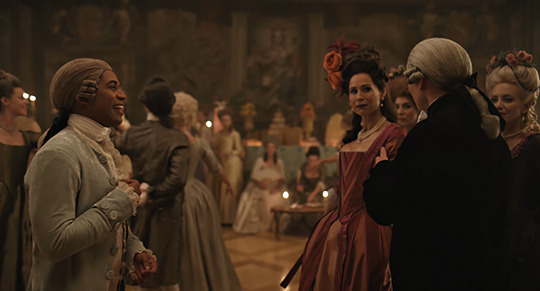
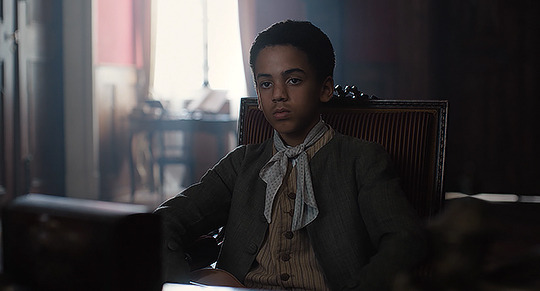
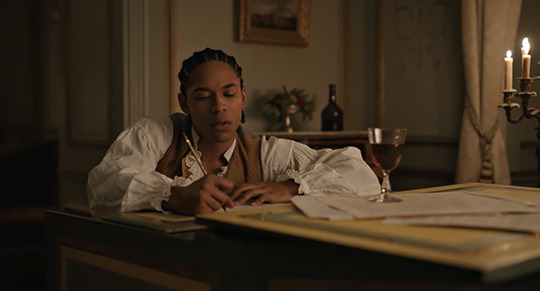
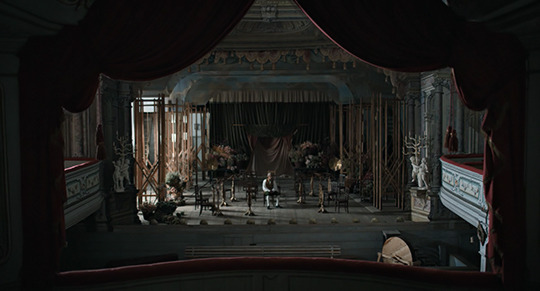
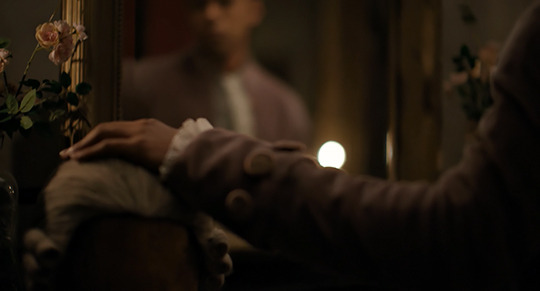
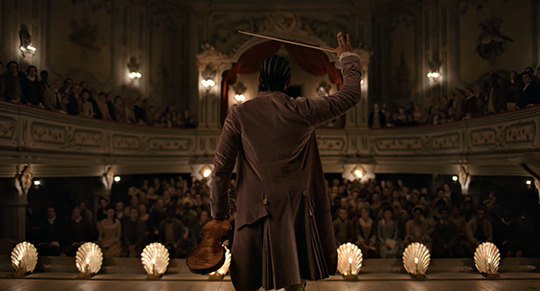
CHEVALIER (2023) dir. Stephen Williams
#american cinema#film: chevalier#director: stephen williams#genre: biographical#genre: drama#genre: historical#genre: music#2020s
56 notes
·
View notes
Text
This year the Dracula Daily tag has me thinking about how people assume authors are revealing themselves through fiction, and genre fiction in particular. Like instead of making deliberate artistic choices authors of horror (or fantasy or sci fi or romance) just sort of let their subconscious bleed onto the page without thought or intention. Every scary thing that happens is something the author is personally afraid of. If the scary thing is also a little sexy, that’s the author’s secret fetish coming through. If a “good” character is wrong about something, then author is also wrong about that thing or if a “bad” character believes something then author condemns it.
I’m not saying it’s not fun to spectate about how an author’s personal life influenced their writing choices, but I do think it’s good to periodically remember that they are choices and not just like, involuntary outpourings of id. Otherwise this sort of armchair biographical criticism can easily diminish any craft on the part of the writer.
2K notes
·
View notes
Note
Sorry to ask something somewhat related to the recent discourse, but do you have any advice to someone trying to teach themselves lit analysis or lit theory? Seems like most online advice ends at "get an English degree lol"
first of all sorry for leaving this for so long, between work and various other Demands in my life i didn’t really have the time/energy to sit down and write up a proper answer for a while. anyway: imo, what’s more important than working your way through a long list of critical theory is honing an ability to respond to a text yourself; being able to take notice of your emotional responses, being able to ask questions about what the text does and what it responds to and whether you think it succeeds or fails. questions like ‘what is the text about?’ are often too vague, and assume that critical practice is a task limited to investigating the ‘correct’ metaphysical properties of a text that we have to uncover, as well as presenting literature as wholly utilitarian (under this framework, a text becomes a vehicle for a ‘theme,’ and nothing more.) in the list below, i’ve tried to be a little more precise about the kinds of questions that can help you become a more confident + critical reader.
[disclaimer: i am not any kind of expert, i have studied english lit at degree level and i do read a lot / make a habit of talking about what i read, but i would not consider myself especially ‘qualified’ and nor should you. i’m explaining a process that works for me, not providing a one-size-fits-all solution to the question of analytical methodology.]
the essence of literary practice is that a text has a terrain where it has to be met with, and where it will be accountable to forces that are often beyond its control or beyond its immediate borders, and a terrain where it asks to be met with, and towards which it will attempt to navigate the reader; the reader’s job is to meet with it on both terrains, synthesise them, and respond to them. so, some of the questions you should be asking about a text include:
what is its context? this can mean a lot of things: when and where was it written, and how might the conditions contemporary to its creation be informing the inner working of the text? is it considered part of a particular literary movement; how does it interact with the core characteristics of that movement? does it invoke other works; if so, how does it respond to them? what biographical information about the author might be relevant to the piece? some books will come with an introduction which, if written well, would cover at least the outstanding details on this list; you can also have a look on wikipedia or other such websites to get a feel for the conditions under which the text was created.
how does it respond to this context? rather than assuming a text to be a passive body onto which its external conditions are exerting their unilateral force, we should always understand a text as being in active dialogue with the context that shaped it. what are the questions typically posed within the movement or genre to which it belongs; how does it answer these questions? does it build on its predecessors in any way? if it’s a responsive text (ie. consistently invoking an earlier text), what does it have to say about the text to which it responds; how does it develop or contravene the template from which it was building? how might it be responding to the questions of its time; which paradigms are challenged? which are endorsed, actively or tacitly? what goes unmentioned? i emphasise critical engagement with context so heavily because it’s often where the meat of the text can be found.
what are the conditions which made this text possible? this is a little different to questions about context, which have a far broader scope; this is a question which seeks to treat a text not as a thing that came into existence of its own accord, but as a thing that emerged as a result of a process of material production that depends upon particular conditions. is it a mainstream publishing house, or an indie press, or self-published? how does this affect its authority, or the standard to which we hold it? how does this affect its relationship to narratives of cultural hegemony? what can that tell us about what hegemony can and cannot absorb? this is me being a big marxist about it but i think this question is woefully neglected in literary studies lol
why did the author make the choices that they made? one of the most important things to remember when it comes to literary analysis is that every choice made in a text is deliberate; every choice about what happens, what a character says and does, what a character looks like, how particular characters interact, how scenes and objects and settings are described, what prose style is employed, what word is used in a sentence, etc., is a deliberate choice being made by an external agent (ie. the author, sometimes/arguably also the editor, also the translator if a text is in translation), and those choices are accountable both to the deliberations of the author and the external cultural narratives with which they necessarily enter into a dialogue. ‘why does a character behave in a particular way’ is not a question that invites you to treat the story like a riddle for which you can find an ‘answer,’ but a question that engenders the following: what does their behaviour reveal about the character, and how might this be situated within the discourse of the wider text? does this behaviour reveal any biases on the part of the author? what sort of expectations does this behaviour establish, and are those expectations met or neglected or subverted? the same process can be applied to themes, settings, plot beats - anything, really. why is this particular adjective used - does it have other connotations that the author might want to draw attention to in relation to the object being described? why does this chapter end here and not here? nobody in a novel has agency that extends beyond the boundaries of the novel itself; part of the practice of analysis means discerning which choices were made and why, and whether those choices were good or bad.
what is your response? analysis is a misleading term for this practice; it’s less about dispassionately picking at a text in search of an ‘answer’ and more about evaluation - assessing the text’s successes and failures and cultivating your personal response to it, which means paying attention to your responses as you go along. some people would argue that ‘did you like/dislike this’ is a juvenile question, but i would disagree - knowing whether you liked or disliked something and being able to describe why it evoked that reaction in you is crucial to an evaluative practice. a text can be conceptually excellent, but falter if its prose is clunky or uninspired or unimaginative; being able to notice when a text isn’t engaging you and asking why that is is an important part of this evaluative process. similarly, what do you make of the themes and developments present in the text; does it dissect its themes with precision, or does it make broad gestures towards concepts without ever articulating them fully? is it original? does it have sufficient depth to it? do you agree with it? are you compelled by it? if you were asked the questions that the novel tries to respond to, what would you say; do you think that the novel misses anything out? has it challenged your own perspective? what are its limitations?
literary analysis is a learned skill, but by its nature of being a skill it gets a lot easier over time, and some of these questions will become intuitive. a good way to hone the skill and develop a greater intimacy with a text is through close reading; this refers to the practice of selecting a passage (or even just a sentence) and picking it apart line by line (word by word, even) to describe in intimate detail exactly how the sentence(s) came to be formed in the way that it/they did. i’ll use the first few sentences of daphne du maurier’s rebecca as an example.
Last night I dreamt I went to Manderley again. It seemed to me I stood by the iron gate leading to the drive, and for a while I could not enter, for the way was barred to me. There was a padlock and chain upon the gate. I called in my dream to the lodge-keeper, and had no answer, and peering closer through the rusted spokes of the gate I saw that the lodge was uninhabited.
so a close reading of these sentences might identify:
‘last night i dreamt i went to manderley again’ is in iambic hexameter; this rhythmically satisfying invocation makes for a smooth opening sentence, and contrasts with the longer, more complex sentences that follow on. the change in rhythm through such a contrast helps to maintain momentum throughout the paragraph.
the first sentence also introduces a few key pieces of information - that this story is being told from the first person, that we are opening with a dream (and that the narrative places stock in the significance of dreams), and that the speaker is going to manderley ‘again’ - ie. that this is opening after an event in which manderley was significant. that the speaker going to manderley ‘again’ in a dream holds importance implies an exile from manderley in the ‘real’ world; this already gives us hints at the broader shape of the narrative.
the speaker’s intimacy with manderley and disregard for ‘telling’ the reader what it is (we do not get, like, ‘manderley is a house’ or something - the passage continues as though we know what manderley is already) helps to develop our sense of immersion in the dreamscape. it also sets manderley up as a place of immense significance.
both ‘it seemed to me’ and the later ‘i called’ have a matter-of-factness to them, a certain dry reporting of the events of the dream which, rather than situating the reader within the texture of the dream itself, refortify us as outside of it, listening to it be explained after the fact.
‘for a while i could not enter, for the way was barred to me’ continues the theme of implied exile that the first sentence gestured towards. the iambic trimeter on ‘the way was barred to me’ creates a lilting cadence which, along with the use of the passive voice, detaches the speaker from an emotive response to this being ‘barred’; it is a reported dream that will not consciously acknowledge the speaker’s feelings about being exiled from manderley at this time. (we instead infer these feelings through how the chapter develops.)
‘there was a padlock and chain upon the gate,’ as a short sentence, falls into the same matter-of-fact register as that which i alluded to above, partly through the use of the passive voice, and - as i explained earlier - varies the length of sentences such that the paragraph retains a particular buoyancy.
the development from the speaker calling to the lodge-keeper to not getting an answer to seeing that the lodge is uninhabited tells a story wherein the speaker at first has authority such that a lodge-keeper would respond to her and let her in; this authority is negated by the lack of response; the lodge-keeper is found to be absent in a development that took place whilst she was herself away, presumably in the state of exile that we have inferred her to be in. ‘uninhabited’ is the kind of word you would expect to be used for an area of land, often with a colonial connotation; this introduces a theme that this chapter (& the book as a whole) goes on to develop, of manderley being a site of colonial decay; as reinforced by the ‘rusted spokes.’
in my experience, close reading is a technique best practiced on poetry, but it’s a very helpful skill to develop in general, and implementing it with prose can elucidate the nuances of a text far more clearly than you might initially realise. in a well-written novel, language is very deliberate and precise!
i think the best thing you can do to develop your skills as a critical reader is to read carefully, and to keep track of your responses to a text as best as possible. keeping a note of what you think a text achieves and how you respond to it each time you read one can be a good way of sorting your thoughts into something coherent and developing your ability to articulate a response. anyway, hopefully this has provided something resembling a guide for how to develop the thought processes that go behind critical practice!
545 notes
·
View notes
Note
Hii!!
Just wanted to ask if you have some authors recommendations for the topics of Herpetology, Biology or Ecology
Thanks!!
Jonathan Losos has put out some fantastic books that range from popular science (Improbable Destinies) to actual textbooks (Lizards in an Evolutionary Tree), and he is also the originator of island biogeography study in anoliid lizards of the Caribbean.
I really quite enjoyed Platypus by Ann Moyal. Great writing on a bizarre and fascinating subject.
Andrea Wulf's The Invention of Nature is simply fantastic science history biographic writing. It blew me away. I had never read anything like it before.
Regrettably, I have a longer list of authors in these genres that I did not enjoy (e.g. Robert Cowie, John Wright, Kate Jackson), and an even longer one I have not yet read but are on my to-read list (Harry Greene, Thor Hanson, Erica McAlister, Neil Shubin, Rachel Carson, Frans de Waal, etc.). Currently I am not making any headway on the latter list because I am currently working my way through all of the Discworld books in their order of publication. And I barely have/make any time for reading for pleasure anyway.
#books#bookblr#herpetology#biology#ecology#answers by Mark#anon#anonymous#about me#book recommendations
131 notes
·
View notes
Text
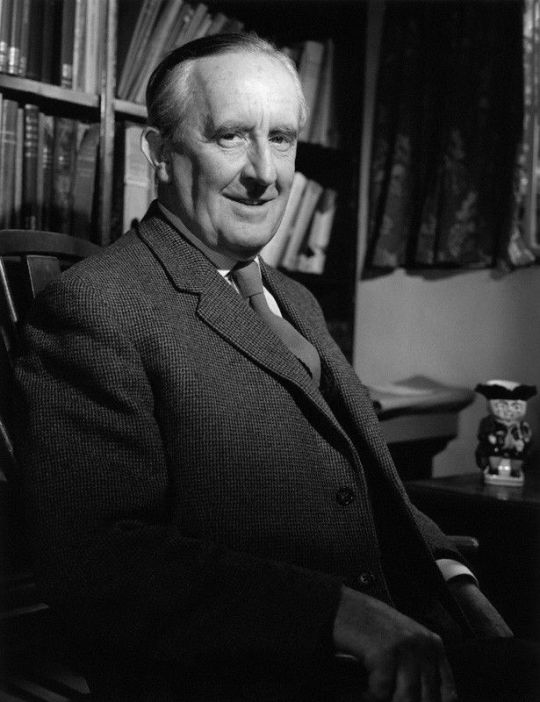
When he began writing The Lord of the Rings in the 1920s, J.R.R. Tolkien was a professor at the University of Oxford.
At the time, fantasy was not considered a “serious” genre.
So, one of his contemporaries explains, Tolkien was mocked by his Oxford colleagues.
They said he was wasting his time “lavishing such incredible pains upon a genre which is, for them, trifling by definition.”
One of Tolkien's biographers writes, “He was regularly asked in a mocking manner, 'How is your hobbit?'”
Amidst a crowd of people who make fun of you, who tell you you're wasting your time, who encourage you to do something less trifling and more prestigious—sometimes, all it takes is one person's support.
For Tolkien, that person was the great writer C.S. Lewis.
“The unpayable debt that I owe to [Lewis] was not influence but sheer encouragement,” Tolkien said. “He was for long my only audience. Only from him did
I ever get the idea that my 'stuff' could be more than a private hobby.”
Takeaway 1:
In his essay, How To Do What You Love, Paul Graham writes, “You shouldn't worry
about prestige...Prestige is like a powerful magnet that warps even your beliefs about what you enjoy. It causes you to work not on what you like, but what you'd like to like.”
Tolkien wasn't warped by his Oxford colleagues and their belief that what he was working on wasn't prestigious.
And after his works of fantasy went on to sell more than 600 million copies, Tolkien would eventually be widely called the “father of high fantasy.”
He is just one example to remind us that what is considered “prestigious” isn't stable in time, and that “if you do anything well enough,” to quote Graham again, “you’ll make it prestigious.”
Takeaway 2:
Tolkien, Lewis, and another writer named Charles Williams were part of an informal literary club known as The Inklings.
Shortly after Williams unexpectedly died, Lewis realized he stopped hearing the way Tolkien used to laugh at the way Williams used to tell a joke. Which made him then realize,
“In each of my friends,” Lewis wrote, “there is something that only some other friend can fully bring out. By myself I am not large enough to call the whole man into activity; I want other lights than my own to show all his facets.”
If not for the encouragement of his friend, Tolkien said he would not have been large enough to call the whole of him into activity.
“But for [Lewis'] interest and unceasing eagerness for more,” Tolkien said, “I should never have brought The L. of the R. to a conclusion.”
- - -
“Just do what you like, and let prestige take care of itself.” — Paul Graham
Written by Billy Oppenheimer
24 notes
·
View notes
Note
I trust your opinion. If you were making bets about what TS11's themes, concepts and sound would be like.. What would you like& prefer? and what would you think Taylor would do?
thank you for trusting my opinion but i am god awful at predicting what taylor is going to do next. that being said:
i think something taylor learned with all too well, anti-hero, and cruel summer is to… trust her instincts, i guess? not that she hasn’t in the past, but she’s mentioned that those songs were her favorites of their respective albums, and she didn’t expect that the general public would enjoy them as much— at least, not to the degree that they have been. but they’ve all been #1s, and more impressively to me, they’ve all broken through into wider pop culture in a way that’s super hard to do nowadays. like can you tell me what’s #1 right now because i can’t. but anyways i think she’ll be following what she wants to hear a little bit more, and trusting that her and the general public’s taste is pretty aligned at the moment. so like, to boil it down into a bingo card prediction, the lead single is going to be taylor’s favorite song on the album
also, bingo square, the color will be white. no evidence just vibes
i think another thing taylor recently learned is trusting that not only her fanbase, but the wider pop landscape would accept complex ideas delivered with a complex vocabulary. in some ways i think she was really burned by me!— she had been taught that it’s the we are never ever getting back together and shake it offs that you send to pop radio, not the all too wells. and then me! got torn apart (deservedly or not), and then the world shut down and it’s not like she needs to find a tour off her next album so what the hell, let’s take out the immediate hooks and replace it with flowery language. and it was a massive hit! twice! but it’s not the kind of music she wants to make forever. so midnights was an added gamble— can you marry the hooks with the collegiate vocabulary? and you can! anti-hero was her biggest chart success ever! so i expect more dictionary/thesaurus starter pack memes in our future, no matter what genre it’ll end up in
that being said, i think she’ll be staying in pop. i maaaaybe could see a kind of pop rock thing happening— think like, the electric guitar she adds to don’t blame me when it’s preformed live.
regardless i do think she’ll be pulling in more rep influences— i’m not super in the buisness of trying to track down when exactly she’s been re-recording, so this is coming from swiftie brain rot not timeline brain rot, but if i had to guess i would say she was mostly recording rep over the summer and with the occasional ts11 track thrown in as well. but i could be wrong maybe she has three albums recorded. idk. i am very interested in what the rep sounds like though, i think that’ll be the biggest clue to what ts11 will sound like
i’m curious how auto-biographical it’ll be. honestly, i could see taylor creating a single character to inhabit and tracking their story throughout an album, which would parallel the emotions she’s going through, but not the exact situations. but that’s me projecting what i would need to do to process the fucking year she’s been through, and taylor has consistently been saying how much she gets from having people sing back the words thought she must be alone in thinking, so like maybe it’ll be intensely About Her, who knows
as for release, i’m a big post eras tour believer. like i know it’s been said a million times but god how impossible would it be to add another set to that thing. like we might get the announcement and lead single while still on tour, but not a full album
i’m also expecting a more talk-y rollout. i would bet we’re getting a couple of print interviews— not anywhere near 1989 or lover levels, but like, you know. rolling stone, vogue, maybe another time, that kind of thing. and in front of camera stuff too— zane lowe, a bbc live longe, some late night appearances, maybe going on kelly clarkson’s show. and maaaaybe a hot wings episode. maybe. i think taylor got a bit burned by the long roll out for lover, and regardless she had other priorities when it came to the midnights release, but it’s been a while and she does like to surprise people by doing something completely predictable. but also this is totally me being like pleaseeeee give interviews they help me with timeline research so much
i predict this every time but visual album!!! if i keep saying it one day it’ll be true!!! it just makes sense she’s been getting so into directing!!!
while we’re in the realm of things that would make me specifically go insane i just think it would be funny if she got paul mccartney to feature on a song. just to be petty. imagine your ex is releasing an album and she gets one of your favorite musicians to play on it. and after the sweet nothing debacle too. oh. so ouchie. also she would have paul fucking mccartney on an album that’s insane in its own right
while we’re throwing spaghetti at the wall. two word title. let’s get crazy maybe 3+ words why not (this is by far the least serious prediction if the title is more than one word i’ll lose my mind)
maybe some religious imagery for the visuals? i’m trying to think of aesthetics taylor hasn’t thoroughly explored. what’s coming to mind is stained glass windows and like, the wild west. this is not at all influenced by me being raised catholic in the american southwest what are you talking about
so to sum up i think i want a pop rock opera with a title along the lines of “the blank of firstname lastname” about a woman in the wild west that has climatic scenes in a cathedral?? i guess that’s the shape i want?? i was not aware that’s what i wanted when i started writing this post okay
32 notes
·
View notes
Text
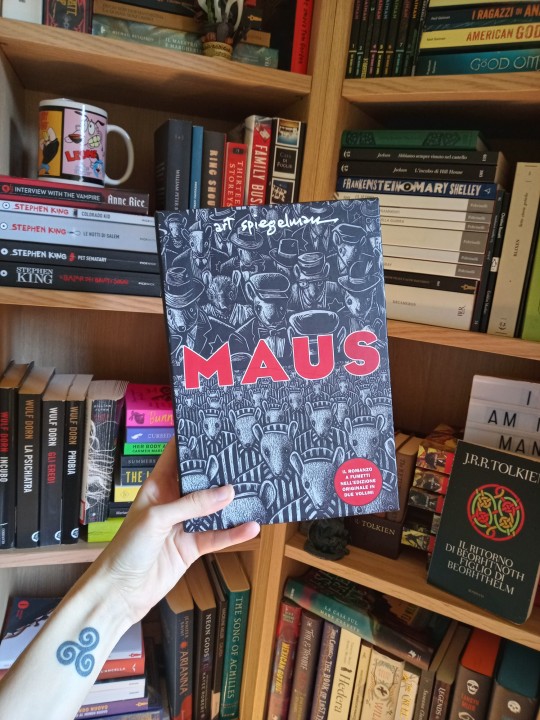
Maus I and II by Art Spiegelman
This graphic novel classic has been on my radar for years. Ever since I started reading this genre I remember seeing this book in bookshops and being pulled to it. I have no idea why I waited so long to finally pick it up, but I am very happy I finally did. As you might know, if you have read some of my book reviews before, not only I really love graphic novels, but I also have a whole section of biographical graphic novel and historical graphic novels. This book in particular is telling the experience of the author's dad during the second world war. The author mixes scenes in which he as an adult asks is father about what happened, and his father's life as a Polish Jew who survived the Holocaust. The book is divided in two volumes the first going from before the war to the invasion of Poland and the author's father experiences until he was brought to Auschwitz, the second volume is telling is experience in Auschwitz all the way to the end to the war.
One of the peculiarities of the book is how the author portrays characters, as he usues animal as a metaphor. Jewish people are represented as mice, nazis are represented as cats, Polish people are represented as pigs, French people as frogs and Americans as dogs. The contraposition between mice and cats is really strong, and it was a very clever way to represent his characters in my opinion. This book is incredibly layered. There's a lot of feeling to it, not only obviously linked to everything that happened during the war, but also between the author and his father. I liked how the author portrayed how complicated his relationship to his father was, it felt very honest and vulnerable. Of course the main body of the story, being set during the war is very emotionally heavy, but it's also told extremly well. To see one specific experience of that time makes all the terrible events we all know about hit even harder. It shows, as the author says himself, that to survive it did take luck, but also every move a person made or not could count and make a difference. His father was a very resorceful and intelligent man who played all the cards he had in order to survive everything he had to face.
As you probably know this book has been banned in the US a lot in recent times (which thankfully also made a lot of people finally pick it up), and I cannot stress enoug hhow important it is to read books that are being banned. In my personal opinion this book could very well be assigned as a reading in high school when studying WWII. We used to have assigned reading that sometimes had to do with whatever we were studying in other subjects, and honestly this book would work very well. The art is indescribable, it's perfect for the story it tells, there's a lot of symbolism that adds a whole other layer to the narration as I was saying, it's very dark and helps to carry the feelings of what is happening. It's a book you should read no matter who you are. It's a classic in the graphic novel genre for a reason.
#maus#bookblr#booklr#book#books#graphic novel#banned book#read banned books#book rec#book review#book recommendation#reading#mine#the---hermit
55 notes
·
View notes
Text

Evonie Apfel
CV: Hikasa Yoko
Biographical Information
Gender: Female
Age: 19
Birthday: March 6
Starsign: Pisces
Height: 175 cm
Eye Color: Forest green
Hair Color: Black
Professional Status
Dorm: Pommeneige
School Year: 3rd Year
Class: 3-B | Student no. 3
Occupation: Student | Dorm Leader
Club: Theater Club
Best Subject: General Magic
Fun Facts
Favorite Food: Apple Dumplings
Least Favorite Food: Brussel Sprouts
Dislikes: Handling Highness’ tantrums and poachers
Hobby: Singing rock songs and fencing
Talents: Fast Reflexes
Idol Stats
Performance: Flexible range of vocals depending on the genre
Choreography: Quick to adjust to different choreography styles
Styling Jewel Outfits: Elegant | Gothic | Cool

Evonie doesn’t mind if she gets a bit dirty when accomplishing a task but she makes sure that she still looks presentable and cleans up to maintain her image as a dorm leader.
She is decently sociable but it is clear that there is a wall she puts up. If she is with people she can be vulnerable around, she doesn’t hold back on what her opinion is to an extent. Those close to her know that she will support her friends throughout their issues.
She has a mild level of patience; she can tolerate small mistakes but if the mistakes keep repeating then she might have to consult the person to see if there is anything wrong.
But if it is anything like Allison does, she definitely won’t tolerate that will sternly reprimand them. Her patience reaching its limit is rather rare, but when it happens then expect yelling and spells being thrown about.
Evonie is good at multitasking, she can hold a full conversation even if she is not looking at what she is doing to face the person she is speaking to. It’s something she developed at home.
She is very competitive, it is something she developed with her dads, and she loved the feeling of being victorious. So, if she ever loses, she is determined to come up with ways to win next time. It may get irritating to lose but she is a good sport, unless she finds out the opponent is cheating, then she won’t tolerate that.
Although she is aware of people and their behavior, she doesn’t always have an accurate conclusion of what the person would do and she would be a bit suspicious but without any concrete evidence she will drop her assumptions and leave it alone.
She makes sure she has proper table manners when eating, but if she is in private, she will slouch and eat to her own standards of comfort, she still keeps in mind of any crumbs that might fall.
Like Snow White, she has a fear of anything scary. She dislikes going to dark places by herself and if she sees something out of the corner of her eye then she will turn her head so fast to make sure nothing was there. She loses her composure and will activate fight or flight mode on instinct.

Hometown: Town of Orchard Fields
Family Life
Evonie was adopted by Rote and Schnee Apfel who became her parental figures. Her birthmother gave birth to her but knows that her illness will be detrimental for Evonie’s future. She contacts the Apfel couple who were acquaintances of hers and asked them to adopt Evonie.
The couple agrees and they raised Evonie in the Town of Orchard Fields. The house is built near a border with a large forest with a lot of wildlife and plants, it’s like a big backyard for her to explore.
Rote was the closest acquaintance of Evonie’s birthmother and it was he who made the decision to adopt the girl. Schnee teases him how during the first few years of raising a baby he went overboard in baby-proofing the house that they had so many pillows and Styrofoam than they know what to do with.
Evonie grew up as a polite girl, though she always had this curiosity to anything she thought might be a cute animal. Schnee made sure to teach her about the safety precautions when approaching a wild animal after he saw his daughter come home with a boar.
Though he doesn’t cook as much as Rote, he does know one recipe that he always taught Evonie, it was apple desserts that were pulled from his great grandmother’s cookbook. He’s kept that cookbook with him and hopes to one day pass it down to Evonie. Evonie’s favorite is the apple dumplings made by Schnee, she can’t get enough of it.
Childhood Memories
At first, Evonie was enjoying her time at school because everyone was very friendly to her. Of course, she is kind to them back to the point where she didn’t want to disappoint them. Until she found the outcast kid that the kids make fun of because of their appearance.
Evonie builds up courage to defend them and befriend the outcast. Which she thought was the right thing to do, at first, the outcast and Evonie got along and they were grateful for their help.
It wasn’t until the other kids cornered them and told the outcast how Evonie was just being nice because they were pitiful and how dare they think they’re equal to Evonie. This made them bitter and slowly drift apart from Evonie who had no clue what was going on.
When she heard news of her friend moving away, she wanted to say goodbye but when she managed to face them, the outcast hurled blame at her for their suffering. Telling her how she has it easy because she’ pretty and she thinks she’s so great but she was arrogant.
Evonie was silent but tears were flowing down her face, both of their parents heard the commotion and awkwardly bid farewell, they didn’t know what was wrong because they thought they got along well.
After that friend left, Evonie took what they said to heart and soon she started to realize how people kept complimenting her appearance instead of her skills. The people who admired her didn’t care about her at all, they just wanted to feel like they’re the popular clique by including Evonie. The ones who didn’t made it clear that they think she’s got it easy because of her looks.
This led Evonie to change her perspective, she didn’t wear pretty dresses unless it was necessary but she kept it simple and didn’t go all out. She didn’t socialize as much with people and often spent her days helping out at home or exploring the forest.
She preferred the company of animals more than people, knowing they care more about her compassion rather than her appearance.
The words of her ex-friend still linger her to this day, she would internally get annoyed whenever someone says she’s better suited for something else or disregards her effort.

Evonie is a 3rd Year Pommeneige student and is the current dorm leader.
Evonie is a model student, always makes sure to be efficient and ensure her dorm students wouldn’t fall behind by offering to help them in their studies to the best of her abilities. When she takes a break, it would be either a walk through the woods or just snacking on anything she craves.
The dorm students at first were unsure of s dorm leader who doesn’t quite portray the innocence of the Princess of the Dwarves, but they find her diligence and mature aura appealing and sometimes compares her to a prince. They nicknamed her the “Apple Knight”.
Evonie excels more when it comes to sports, especially fencing. Her Papa taught her and often sparred with her when he has time. Cooking is also another strong point in her education besides general subjects.
Regarding magic, she is more combat focused and often likes to physically incorporate spells with her movement like swinging a sword.
She thought that most students in DCA would be like the ones back home, only caring about appearances but she finds out that there are a lot of different girls here. She feels at ease to know that she can at least lift the weight on her shoulders.
Somewhere down the line, she developed this second persona to fully explore her wild side. Evonie wanted to feel free without having to think twice about her image. So, she set up a persona to really let herself go.
She showed up as a mystery idol once and it all developed from there. People have called her persona “The Masked Maiden” and she takes great measure to make sure no one can figure out her identity. So much so that she joined the theater club to improve her façade.
Evonie’s grades are fairly high, though she enjoys PE more because their coach has thrilling obstacle courses that really spark her motivation. Evonie is most skilled at fencing compared to the rest of the exercises.
School Relationships
Evonie is more drawn to befriend girls who can light up the competitive fire in her as well as genuinely enjoying her company. Vidya and Jinlong became her rivals due to their athleticism and how they always do things their way. Evonie admires them for wanting to be true to themselves so she follows their example.
Ella is another close friend of Evonie, though she barely remembers meeting Ella. Ella remembers Evonie as the Glaciel family went to Orchard Fields for a vacation and she remembers this pretty girl with dark hair who was nice enough to show her around the stalls and offer her some apple tarts. Though Ella seems like someone Evonie wouldn’t befriend at first, the girl’s kindness won her over.
They got even closer when Ella confided about her previous stepmother who left scars on her, mentally and physically. Evonie has not experienced that kind of abuse but she understands when Ella worries about appearance and wanting to hide what bothered them. She tends to shield Ella from anything bothering her out of habit.
Allison was a pain in the neck for Evonie, she can’t find common ground with the girl at all! She can somewhat understand not wanting to do etiquette but it’s still a class requirement. Evonie thinks she’s too reckless while Allison thinks Evonie is too hung up on maintaining an image. The only time those two can agree on something is through cooking, thought that ends quickly when Allison slips any raw fruit other than apples into her mouth.
Perrine and Evonie often share recipes and both found a common ground in sharing family traditions learned from past generations. Though Evonie can’t decide whether to be impressed or revolted when Perrine makes that weird food combination and eats it like it was 5 star.
Evonie’s relationship with Applette, her dorm fairy, is akin to her seeking comfort in the little creature. Applette’s form is derived from Evonie’s desire to feel genuine connections with other people. Applette is always sweet and kind, a contrast with Evonie’s cool and somewhat stern personality.
The fairy is there to be sympathetic as well as paint Evonie as a reliable sister figure to the dorm students.

Highness
Highness is a purple peacock that was given to Evonie when Schnee found an abandoned egg in the forest but there was no parent to be found. Highness was rather clingy as a chick, always looking for Evonie and crying whenever she went to school.
But Evonie still can’t understand how his attitude changed when he grew up, she guessed it might have been puberty that made him this way. She remembered using up all her saved money to buy him all those pricey bird products… it was definitely when she put too much effort into his care that he became this way.
Highness is arrogant and would stomp on anyone that he doesn’t deem worthy to get close to his personal space. Not even Evonie was spared but he does it less often when the threat of being sent to the vet was used.
Highness has his own personal trunk full of jewelry that he has Evonie dress him with, she doesn’t tell him that they’re mostly made from glass by Ella. There was no way that Evonie could afford such expensive jewelry so imitations are good enough as long as he doesn’t know.

Her unique magic is called, “Friends of the Forest”. The unique magic developed when Evonie felt awful after the confrontation with the ex-friend that she made the mistake of running into the forest during a rainstorm. She ended up crying under a hollow log from how hurt and scared she was.
Remembering the lullaby her dad often sang to her when she was scared, she quietly hummed the song unaware that the animals in the forest gathered around to comfort her. She was shocked at first to see so many animals around her but they brought her the comfort she needed until her parents found her.
Evonie often did this in private because it felt like her sanctuary if she ever gets stressed. She’s developed a soft spot for animals, Highness is a complicated case though.
She also excels in using fire magic due to her living in the woods and her family often having to camp out on special occasions. She can also use this offensively during matches by either setting projectiles or a dome trap.

Rote Apfel
Rote Apfel is called, “Dad” by Evonie and he has red hair and a large build that may seem intimidating but he is actually quite sweet and efficient in several handiwork around the household. Rote is only muscular because he did a lot of errands before which included chopping wood and heavy lifting.
He runs an animal sanctuary that cares for injured or abandoned animals. Quite a few of them have been adopted as family pets so it is expected to find a few animals lounging in their household.
Rote can’t help himself, all of the animals seem so cute to him, and he wished he had a bigger house to adopt them all. Schnee had to remind him that there is a limit to how many animals they can keep in the house.
Rote taught Evonie a lot of life hacks and tips on easy fixes on problems that usually need professionals to fix.
He is such a protective papa bear and often times his pouting face looks so intimidating without even meaning to. He is the empath that contrasts with Schnee’s parenting style.
Schnee Apfel
Schnee Apfel is called, “Papa” by Evonie and he has white hair and a slim build but he is very athletic with good reflexes. At first glance, he doesn’t seem intimidating due to his beautiful face but the moment he gets angry is when he becomes terrifying.
It comes with his job as a park ranger, he works in the town’s tourist park. There are times when he was called to handle a rampaging animal that might harm people nearby. But there are also entitled bastards or people with barely a brain cell who get themselves into trouble at the park.
Schnee doesn’t tolerate any nonsense in the park and is often called to handle the problematic visitors.
Schnee was the strict parent but he doesn’t go overboard in discipline. Most of the punishments when Evonie did something wrong was just household chores while he explains to her why it was wrong. He makes sure to properly teach her without being too harsh as he knows that children will be children.
He is the tough love kind of father which contrasts Rote’s parenting style.

Character’s name derives from “Ebony” with a few letter changes while her last name, “Apfel” is the German word for Apple.
Evonie can’t eat any other fruit raw besides apples, it’s still a mystery to her as to why. They’re fine when it comes to desserts or even jam but the raw product never fails to make her dislike it.
Despite her confidence, she actually can’t stand anything related to horror. She will shriek and hide away.
Her early concept was supposed to be a more confident and badass, Snow White. Her first two designs looked too similar to Weiss Schnee from RWBY, so she was redesigned.
21 notes
·
View notes
Text
Oh Hello there, Gaysis!
In the words of our wisest one, og mod: “If you can’t find queer media that represents you, then make it yourself!”
Truer words have never been spoken, and by honoring those words, we bring you a space of love, acceptance, and creativity. A space to use your voice and become the visionary of what it means to be Desi, queer, and a survivor. So, once again, calling out to all the many many talented writers, artists, poets, directors, leaders, biographers, dreamers, lovers, or those who simply want to tell your story…come and show us what it means to be you.
The Desi LGBT Fest Mods welcomes you to,
✨ Desi LGBT Fest 2023!!!✨
Where we share stories, poems, essays, art, photographs, and more:
Queer in themes: this is inclusive of trans, asexuals, aromantics, and all the other niche identities of the LGBTQIA+
Set around desi characters and/or desi settings. Desi including India, Pakistan, Bangladesh, Shri Lanka, Nepal, Bhutan, etc.
That’s it! It can be any genre, any desi language, any length. Engage as much as you want, as many times as you want, however you want.
🧡💛💚💙💜💓
The main tags that will be featured for this year’s fest are:
#desilgbtfest23 for the overall main contents
#dlf23day[#] (ex. #dlf23day1) for submission-specific prompts each day of the fest
Mods and Creators can include any tags they deem necessary outside of these two for their content, however, if you want your work featured in our blog, then MENTION US at @desilgbtfest on your post and use the tags above.
And of course, follow the blog for future updates
#desilgbtfest23#desilgbtq#desiqueer#desilgbtpride#desipridemonth#pride#lgbtq#queer#gay#pride month#desilgbtfest launch announcement#reblog#queer pride#aroacepride#transpride#queer community#desi community#desi lgbt#mod navi#og mod#mod raissa#queering the scene
81 notes
·
View notes
Text
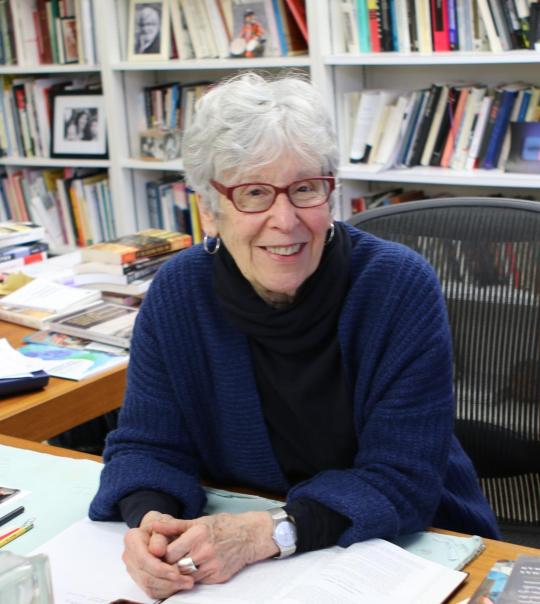
With her book The Return of Martin Guerre (1983), the historian Natalie Zemon Davis, who has died aged 94, attracted a wide readership and inspired future historians. It came out of working as a historical consultant on a film of the same name released the previous year, starring Gérard Depardieu and Nathalie Baye, and directed by Daniel Vigne.
Martin Guerre, a peasant farmer in the 16th-century Pyrenees, left his wife Bertrande to go on a journey, only to have his marital role usurped by an impostor who “returned” pretending to be him. After some years of cohabitation, Bertrande denounced the impostor, her testimony seemingly confirmed by the return of the real Martin Guerre. The impostor was duly tried and executed.
The film-makers’ questions about period detail and behaviour intrigued Davis. But other aspects of the movie genre troubled her, so she went back to the archives and wrote up her own compact account of 120 pages.
A gripping narrative and a lesson in method, Davis’s book raised questions about the reliability of evidence and the motives and worldviews of peasant men and women from a faraway place and time. It is an example of a microhistory, where historians turn away from the big canvas of kings, queens and battles to understand ordinary lives, often through a highly localised case study.
The Return of Martin Guerre was one of a series of works including Society and Culture in Early Modern France (1975), Fiction in the Archives (1987), Women on the Margins (1995) and The Gift in Sixteenth-Century France (2000). Davis’s trademark was the longer essay or biographical study, often focused on marginal or misunderstood personalities, all spiced with a sharp attention to issues of religion, gender, sex, class, money and power. Historical records for her were never dull: she once described them as “a magic thread that links me to people long since dead and with situations that have crumbled to dust”.
Born in Detroit, Natalie was the daughter of Helen (nee Lamport) and Julian Zemon, a textile trader, both children of east European Jewish immigrants to the US. While studying at Smith College, Massachusetts, at the age of 19 she fell in love with Chandler Davis, a brilliant mathematician and socialist activist; they married in 1948 and went on to have a son and two daughters. Her first degree, from Smith (1949), was followed by a master’s at Radcliffe College (1950).
Her life with Davis was productive and fulfilling but also complicated her early career, as his principled stances against McCarthy-era restrictions on political expression led to both him and her being barred from a number of posts, and from travelling abroad. This she needed to do for her doctorate on 16th-century France.
After finally gaining her PhD at Michigan University in 1959, Davis went on to hold positions at Toronto, moved in 1971 to the University of California, Berkeley, where she was appointed professor, and in 1978 to Princeton, retiring in 1996. She became only the second woman to serve as president of the American Historical Association (1987), and the first to serve as Eastman professor at Oxford (1994). In 2012 she was appointed Companion of the Order of Canada, and in the US was awarded a National Humanities Medal.
Davis helped establish programmes in women’s studies and taught courses on history and film. Her AHA presidential address, History’s Two Bodies (1988), summed up her thinking about gender in history. It was also the first such address to be printed with illustrations. Her book Slaves on Screen (2002) was one of the first in-depth treatments of this topic by a professional historian.
In her last two books, Davis returned to the exploration of mixed identities. Trickster Travels (2006) was about the 16th-century scholar Leo Africanus, whose complicated Jewish and Muslim roots in North Africa she expertly unpicked. Listening to the Languages of the People (2022) focused on the 19th-century scholar Lazare Sainéan, a Romanian-Jewish folklorist and lexicographer who published one of the world’s first serious studies of Yiddish, but had to abandon his Romanian homeland for Paris in 1901.
At the time of her death, Davis was completing a study of slave families in colonial Suriname: it is hoped this will appear under the announced title of Braided Histories. In this way she continued to explore unconventional topics, going against the grain of Eurocentric history and looking instead at the boundaries of identity and belonging in very different settings.
Visiting many universities and research centres in her retirement, Davis encouraged younger scholars by conveying the potential of history to inspire empathy and hope for change. While at my own institution, the University of Amsterdam, in 2016, she made it her main aim to talk to students rather than to other professors. In 2022-23 she presented her latest work in online seminars, and wrote and corresponded actively until shortly before her death from cancer.
Chandler died in 2022. Natalie is survived by her three children, Aaron, Hannah and Simone; four grandchildren; three great-grandchildren; and a brother, Stanley.
🔔 Natalie Zemon Davis, historian, born 8 November 1928; died 21 October 2023
Daily inspiration. Discover more photos at Just for Books…?
14 notes
·
View notes
Note
Who is your most hated Seymour? For me, it's John, Thomas, Edward and Jane.
roflmao, tbf, i know intellectually that there's not enough there there to justify hating john seymour, but he does give me bad vibes...whatever happened with catherine fillol was weird and i do get the sense he was involved even if not in the rumored way. and also, when siblings hate each other to such an extent, it's often bcus they were pit against each other by their parents, so i get the sense he was not a good father (there's some debate on whether he died late 1536 or 1535, tbf, but if it was the former it's strange that none of children seemed to mourn his death, that he wasn't mourned at court as the queen's father, etc) . margery doesn't have enough about her known for me to judge; it's sort of weird to me that this stereotype has fallen she and jane had a bad relationship and her favorite child/daughter was elizabeth (this occurs in like...several...novels). we don't have an equivalent positive remark to 'next to mine own mother, no woman alive i know better' (AB, about her own, and to bridget wingfield), nor any records of them often being in each other's company during significant events or eras, but we don't have anything negative either. i get you have to make choices in fiction and 'neutral' is not an interesting one but like...damn.
what's interesting about edward and thomas is that, even before their sister becomes queen, edward is not spoken of well by his contemporaries. very early (iirc, 1535) on, his 'small conscience' is decried, and he becomes such an avaricious figure that cromwell and the king have to interfere in his attempts to manipulate and loophole property laws to his own advantage and the impoverishment of others (and, not usually in his favor, despite him being a royal in-law). thomas, however, seems like he's better liked in the 1530s, although this can maybe be attributed to him being more of a nonentity (a comparative example is some tudor authors insisting GB was 'better liked' than his sister anne-- not true, it seems-- or more often, that their sister mary was...which is probably true, but also probably more indicative of relative lack of power and positions and leverage than 'kinder' personality)...it's not until the 1540s that we get comments of the same genre ("somewhat empty of manner"). thomas thus seems more like a figure of gradual corruption, his arrogance was increased was by his nephew becoming king, it seems, and resentment brought out an ugly side of his character (arguably, the same with edward, just earlier on).
it's extremely unpopular to say this on here, but yeah, jane is definitely not a favourite of mine, either. but i don't think my reasons for this are really common...i don't care if she slept with henry before marriage, i don't care if she didn't, i just find her biographers weirdly contradictory in their judgements of her character, the nature of her rise, and her own beliefs. there's also like, this sense of historic illiteracy from some of her defenders...joining a royal household (as far as the most prestigious positions, that is) was not the equivalent of serfdom (as in, they could leave at any time). jane's supporters were courtiers who hated anne, so it's reasonable to assume she did, as well. so, there's this sort of moral hypocrisy about jane as a figure and her advancement and how she came to her position that has always prevented me from warming to her as a figure. 'she hated anne and all she stood for' explains her involvement in her downfall, but not her securing the position in her household in the first place. and by virtue of her close proximity to anne as queen, she also knew that it was nigh impossible that she was actually guilty of the accusations of adultery.
what else...her defenders insist that the oaths of supremacy and succession were anathema to her moral compass, yet she likely did have to have had taken them herself, just as a subject, and if not that then definitely as a member of anne's household. this wouldn't have martyred/imperiled her life, althought it probably would have her career (elizabeth darrell never took these, so i wonder if the penalty for women was different...? barton is often cited as an example but this was not in her indictment. princess mary seems to almost have been a victim of this, but it might've been more that her signing was more important since she was a rallying point for dissenters).
and even if jane never took these, the presence of noblewomen serving anne as queen lent to her greater image of royal legitimacy. she had to have known that, and if she didn't believe her position was legitimate...then why be part of that tapestry? there's not an equivalent to her predecessor to be made here, not when anne left her own predecessor's household and began her own as soon as she came to believe catherine was not legitimately queen or henry's wife. any credulousness towards contemporary report of this time would suggest anne was extremely hostile towards her rival, but there is a difference between declaring that you'd sooner watch your rival hanged before revering them and, well...actually doing that (...essentially, if not literally).
actually, i don't think there's actually much to suggest jane was set against the religious supremacy unless you make some suppositional leaps (the dissolution wasn't so explicitly connected here, her support of mary as princess, even if rather cosmetic, could be seen as support for her decision not to take those oaths herself for nigh on two years...). nor against succession acts as brought by parliament, since the same illegitimized any potential rivals to her future children, and she seemed to make a point in one of her only pieces of writing we have in emphasizing edward's legitimacy (implicitly, at the expense of her stepdaughters).
the narrative fiction i probably dislike about jane the most is this idea that she was so reverent of catherine's memory, it's really fucking weird, honestly... it bothers me because i know it's embellished to increase reader/viewer (the tudors comes to mind) sympathy and somehow for me it does the opposite, lol. there's something about the concept of her trading on the memory of this beloved woman (who, herself, probably didn't even remember jane, there's nothing to suggest any kind of friendship between them) who was exiled, this woman whom jane did not a single thing for (not even abstaining from joining the household of her rival), that just really grosses me out. henry was the one who was her husband, and obviously he was a fucking asshole to and about her, but there's at least something more...direct, in his attempted erasure of her memory. it's always bothered me that it's never acknowledged that the antecedent (which was carried on throughout) to jane's queenship was the erasure of both her predecessors, the illegitimization of both their daughters, both of them being subordinated, and, more or less (mary present for christmas, elizabeth not, but both there during the rebellions) equally expelled from court.
#purplefictionlover#tl; dr that got way longer than i expected . lol#but yeah honestly jane would be a more appealing figure to me were this not the case#if she were sort of neutral about coa. idt i have hated a fictional character as much as i hated weir's iteration of her lmao#sobbing in her bed for 24 hours straight the day of anne's coronation...#sobbing in her bed for 24 hours straight the day of coa's death....#i felt oh so kh in the tudors#'it's not aBOUT YOUUUUUU '#bcus the thing is that if she was... how did she justify. any of that?#did she just hate herself? the answer alison weir gives us is yes and that was exhausting to read#she is very very self-loathing in not having been able to do anything for catherine and she hates her family for 'making' her join anne's#household and i fell asleep and snored so deeply it registered on the richter scale#the belief from this genre of tudor authors seems to be women are just disgusting if they had any sort of agency#(weir really reduces anne's agency as well...at least early on#and they're both very very dull as a result)
10 notes
·
View notes
Photo

I could not think of anything but his fingers on my neck, his thumb on my lips.
- Tracy Chevalier, Girl with a Pearl Earring
Nicknamed the “Mona Lisa of the North,” Girl With a Pearl Earring is probably Johannes Vermeer's most celebrated work. The painting has captivated so many people throughout history, drawing unprecedented crowds to The Mauritshuis, the art museum in The Hague, Netherlands where it is now housed. It became iconic for the distinct position of the girl, her enigmatic gaze, the colours and the delicate quality of the light.
Girl With a Pearl Earring was not always as popular as it is now. It ended up in Vermeer's patron collection, before it was sold on by his son-in-law. The work was lost for 200 years until a collector bought it for 2 guilders and discovered it was a Vermeer once it had been cleaned. After his death in 1902, it was donated to the Mauritshuis in The Hague, where it has been hung ever since.
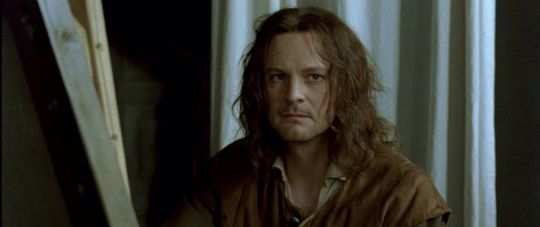
Vermeer himself is as enigmatic as his most famous painting in the history of art. Once nicknamed “the sphinx of Delft”, his native town which he never left, he produced little - only about 34 paintings survive from his oeuvre. He also left behind few biographical traces, though we do know that his wife bore him 15 children. He began his career as a history painter, depicting scenes from ancient Greek and Catholic lore, but from the outset, he trained his eye on women. He soon shifted to the genre scenes of domestic life that made him famous. As the art critic Edward Rothstein wrote, his lifetime project was “an almost metaphysical quest for the precariously poised instant, an ideal we would now consider photographic.”
He is recognised as a master of light who specialised in painting women in sparse domestic interiors, and his pictures are prized in part because they are often suffused with mystery. Unlike some of his Dutch contemporaries, who crammed their compositions full of material objects and narrative detail, Vermeer got a kick out of teasing the viewer and withholding meaning. In one of his canvases, for instance, an elegant couple is engaged in a music lesson - but is the gentleman her tutor, a suitor, or her lover? We will never know.

But what of the Girl herself?
The truth is that despite frenzied speculation (was she the artist’s daughter, or perhaps his mistress?), we will probably never know the identity of the model for Vermeer’s Girl - if there even was one. As such she is even more perplexing. 17th century viewers would have looked at Vermeer’s painting and seen not a portrait but a type of picture known as a ‘tronie’. A ‘tronie’ is a study of a head and shoulders dressed in exotic clothing. The giveaway is the turban: it lends an oriental flavour to the canvas, transporting viewers to a faraway realm of the imagination. While it is possible that someone modelled for it, just as Rubens often painted figures who looked like his wife, it isn’t meant to be a specific person, but someone more generalised, timeless and mysterious - perhaps a sibyl or a figure from the Bible.” Moreover, according to one theory, the impossible pearl, which is too big to be worn in reality, was meant to be understood as a piece of costume jewellery - so adding to the general atmosphere of artifice and make-believe.
This sense of mystery is what attracts people to the Girl. Partly, she’s just gorgeous. But the composition is also very clever. Out of that dark background, she pops into our space looking very much alive - and the gesture is a big part of that. Her mouth is open, which you don’t see that much in Dutch paintings, so she seems as if she is about to talk to you. The viewer is dying to know what she’s going to say. But she doesn’t say anything, thus revealing nothing, and the viewer is left trying to fill in the story.
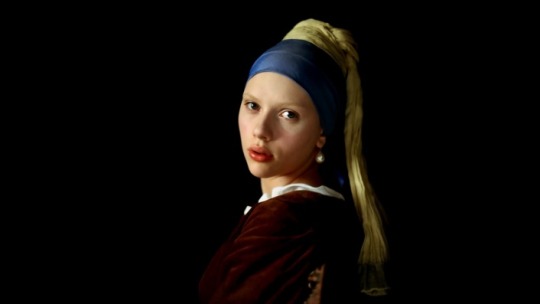
Tracy Chevalier, the novelist herself chipped in with a similar observation that, “The image works because it is unresolved. You can’t ever answer the question of what she’s thinking or how she’s feeling. If it were resolved, then you’d move onto the next painting. But it isn’t, so you turn back to it again and again, trying to unlock that mystery. That’s what all masterpieces do: we long to understand them, but we never will.”
#chevalier#tracy chevalier#quote#vermeer#johannes vermeer#art#painting#dutch#girl with a pearl earring#arts#culture
71 notes
·
View notes
Text

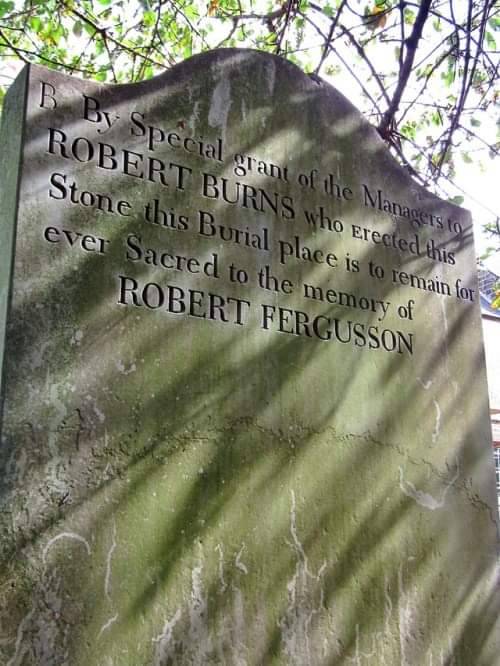
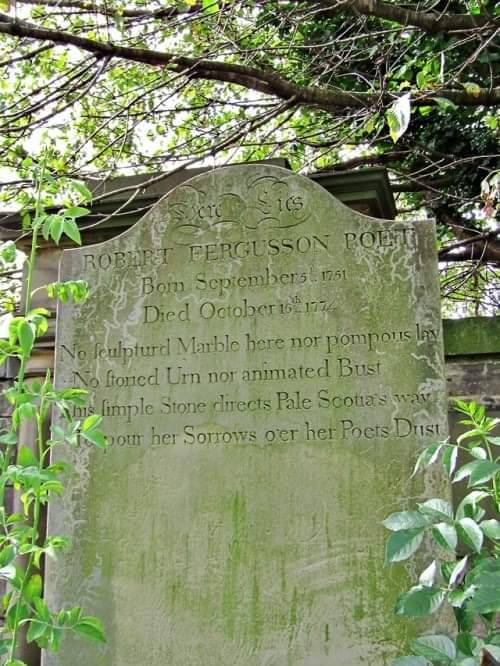
On September 5th 1750, the poet Robert Fergusson was born in the Canongate in Edinburgh.
He may have only lived for 24 years, the last of which was traumatic, but those short years not only inspired Scotland’s best-known bard Robert Burns and the writer Robert Louis Stevenson, it also paved the way for better treatment of people with mental health conditions thanks to the work of Doctor Andrew Duncan.
Robert Fergusson was born of Aberdeenshire parents in Cap-and-Feather Close, in Edinburgh’s Old Town, on 5 September, 1750. The street has since disappeared, having been demolished during Fergusson’s lifetime to make way for the North Bridge, many of you will have walked over where Cap-and-Feather Close, it is said to have been where the junction at the Tron Church is, the road that now takes you over North Bridge towards Princes Street.
After primary education in Edinburgh, Fergusson entered the city’s High School in 1758, attaining a bursary to attend the Grammar School in Dundee in 1762. Two years later, he enrolled in St. Andrews University. As a student, Fergusson became infamous for his pranks, having once come close to expulsion. Despite this riotous reputation, the poet’s education stayed with him, he moved back to Edinburgh to support his mother, after the death of his father.
He got a job as a copyist for the Commissary Office main concern was, of course, poetry, and on 7 February, 1771 he anonymously published the first of a trio of pastorals in Ruddiman’s Weekly Magazine. Originally he wrote in English but by 1772 he had started to use the Scottish dialect in the standard Habbie verse form - a form which would later be copied and made famous by Robert Burns, indeed this style is now called the Burns stanza, perhaps it should be The Fergusson Stanza?
Fergusson’s own muse was Allan Ramsay and, like the be-turbaned Ramsey, followed a bit of a bohemian lifestyle in Edinburgh, which was then at the height of an intellectual and cultural tumult as the nerve centre of the Scottish Enlightenment. He wrote a total of fifty poems in Scottish English and thirty-three in the Scots language, but it is for his remarkable exploits in the latter genre that he should be acknowledged and acclaimed. His poetic subject matter paints vivid accounts of the life and characters of ‘Auld Reekie’ and drunken encounters with the notorious Edinburgh City Guard of Captain Porteous, the ‘Black Banditti’ of ‘The Daft Days’.
Fergusson began to suffer from depression in 1773, biographers have described his condition as ‘religious melancholia’, but regardless of whether or not that was the case, he gave up his job, stopped writing, withdrew completely from his riotous social life, and spent his time reading the Bible. He had heard about an Irish poet, John Cunningham, who had died in an asylum in Newcastle. That inspired ‘Poem to the Memory of John Cunningham’, and Fergusson became terribly afraid that the same thing was going to happen to him. Tragically, his dark prediction came true. In August, 1774, Fergusson fell down a flight of stairs and received a bad head injury, after which he was deemed ‘insensible’. His friend, the good doctor Andrew Duncan, had no choice but to admit him to Darien House “hospital”, Bedlam.
Doctor Andrew Duncan, the name might be familiar to those from Edinburgh, on finding Fergusson before being admitted to the “hospital” described him as being in a “state of furious insanity” he saw no choice but to have Fergusson taken to the city’s Bedlam madhouse. Conditions at the Bedlam, which was attached to the Edinburgh Charity Workhouse behind modern-day Teviot Place, were notoriously awful. Patients were treated as inmates, locked in cold stone-flagged cells, with only straw for bedding. The young poet was only there for a matter of weeks when he suddenly died. He had only just turned 24.
Fergusson was buried in an unmarked plot in The Canongate Kirkyard. On visiting Edinburgh in 1787, Burns paid for a headstone over his long-neglected grave, commemorating Fergusson as ‘Scotia’s Poet. I have taken many friends to visit Fergusson’s last resting place over the years, mainly down to my late mother’s love of Burns, but also because I love showing people around my hometown.
The first picture shows the statue of Robert Fergusson outside the Canongate Church, with my very own Saltire attached to it, if passing go pay your respects to the man, who inspired Rabbie Burns, who, under different circumstances might have been lauded as our National Bard, if you like a wee whisky perhaps raise a glass tonight on what might have been “Fergusson’s Night”
The pics are my own, I drop into Canongate Kirkyard almost every time I am in the area.
20 notes
·
View notes
Text
370. Various Authors - Dragon #95 (March 1985)
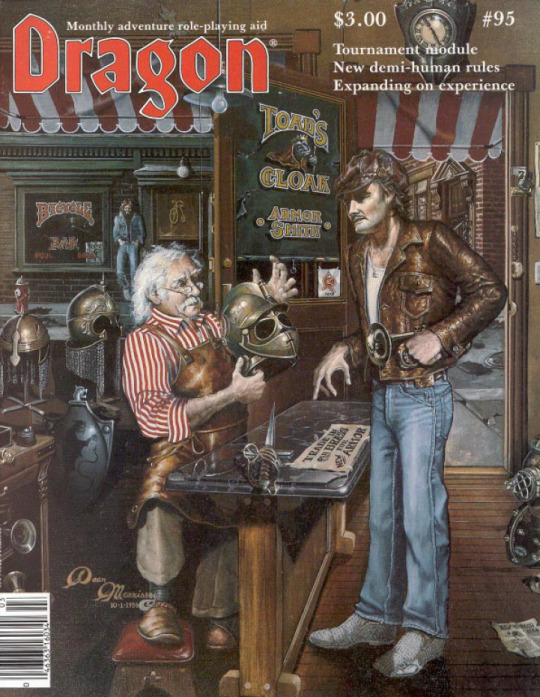
This might not have the most famous or best cover of all Dragon magazines and that might lead you to think that it's just one more issue like all the others. However, you couldn't have been more wrong. With half a dozen good articles and features for D&D and AD&D, this also has two items of historical importance.

First among these is a column by Gary Gygax which I have seen quoted again and again, and it's the one about the relative influence of Tolkien in the development of (A)D&D, a kind of a biographical article, it contends that Tolkien's influence was extremely limited, giving credit instead to the American pulp writers which helped found the Sword and Sorcery genre like Robert E. Howard and those who followed in his footsteps, such as Fritz Leiber and L. Sprague de Camp, as well as other pulpy authors such as Lovecraft. Gygax even credits other British writers such as Michael Moorcock above Tolkien, which he frankly finds to be "boring".

The other important entry in this issue is the first ever published adventure module set in The Forgotten Realms, entitled "Into the Forgotten Realms'', it's a short competition adventure module by Ed Greenwood, set in the Dales as your party goes from Shadowdale to the lost elven city of Myth Drannor attempting to recover or destroy magical artifacts before the evil ruler of Scardale, Lashan, manages to obtain them. Other than this there are plenty of articles on subjects such as raising levels for demihumans by Gygax (another momentous article), the ecology of the cockatrice by Greenwood, ape stat blocks for the game, tactics for wilderness combat, distribution of XP and so forth. Brimming with content this one.
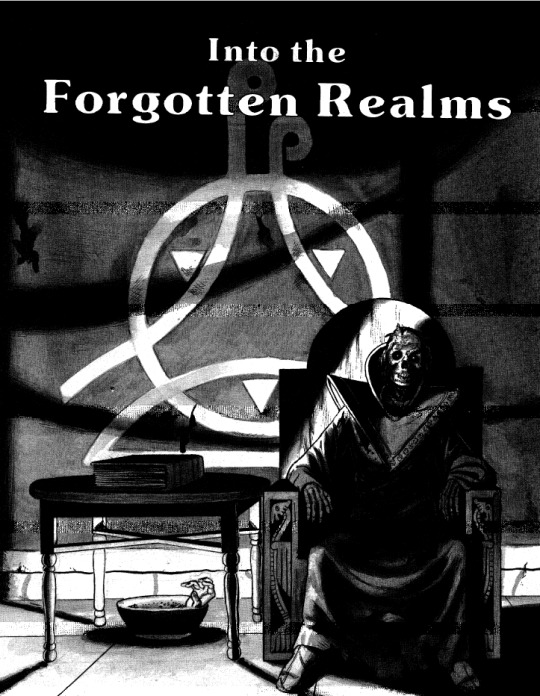
#adnd#dnd#ttrpg#ad&d#d&d#dnd art#dungeons and dragons#dungeons & dragons#forgotten realms#gary gygax
9 notes
·
View notes
Note
🍋 favorite genre to read / watch / write
🍐 if you could make one character real, who would it be
🫐 some place you’d love to visit
🍌 what is one talent you wish you had

morg i love you forever and endlessly.
🍋 favorite genre to read / watch / write
oh i answered this one already but! i can give you some runner up options. my second favourite genre to read is probably autobiographical / biographical accounts of some very cool people. my second favourite genre to watch is crime dramas. my second favourite genre to write is slice of life fluff.
🍐 if you could make one character real, who would it be
um. uh. shit. oh! i know! Nanny Ogg, just because i'd like to get bossed around by her and eventually enfolded into the greater Ogg family.
🫐 some place you’d love to visit
antarctica for the penguins. australia so i can see my incredibly cool cousin Ames. italy for the food. mexico for the food. and everywhere that my internet friends live just so i can hang out with you all!
🍌 what is one talent you wish you had
okay so it's no so much a talent (i think) but my mum can think in 3D in a way that is incredible. she has a truly insane amount of spatial awareness that i just don't have.
#pfh answers#it's seriously impressive#like she can look at a space and figure out if something will fit without needing a tape measure#or when she was helping me get my mattress up the stairs she just looked at it and the stairs and went 'oh yeah we can move it if we pivot'#meanwhile i was going 'how the hell is this thing going up there?!'#(not the first time i've said that BUT in a wildly different context)
9 notes
·
View notes
Text
24 in 2024
@lettersfromthelighthouse tagged anyone with the letter L in their username, and that's me! So this is 24 books I want to read in 2024 (not including the ones I've finished already, am currently reading, or planned rereads). I've included the genre along with any other relevant information (if it's for my dissertation, if I'm reading it in French, etc.); most are classics.
Antigone by Sophocles (classic)
Ariadne by Ouida (classic; dissertation)
The Biographer's Tale by A. S. Byatt (historical fiction)
Bitter Orange by Claire Fuller (historical fiction)
Cecilia by Frances Burney (classic)
Contes by Charles Perrault (classic; in French)
The Daisy Chain by Charlotte Mary Yonge (classic)
Deerbrook by Harriet Martineau (classic)
The Doctor's Wife by Mary Elizabeth Braddon (classic; dissertation)
Fairy Tale by Stephen King (fantasy)
Far From the Madding Crowd by Thomas Hardy (classic)
How to Be a Victorian by Ruth Goodman (nonfiction)
Ideala by Sarah Grand (classic)
The Idiot by Elif Batuman (literary fiction)
Jane Austen: A Life by Claire Tomalin (nonfiction)
Lonely Castle in the Mirror by Mizuki Tsujimura (fantasy)
Mortomley's Estate by Charlotte Riddell (classic; dissertation)
New Grub Street by George Gissing (classic; dissertation)
The Perpetual Curate by Margaret Oliphant (classic; dissertation)
Richard & John: Kings at War by Richard McLynn (nonfiction)
Sister Novelists by Devoney Looser (nonfiction)
The Stranger by Albert Camus (classic; in French)
The Way We Live Now by Anthony Trollope (classic; dissertation)
The Winter's Tale by William Shakespeare (classic)
I know most people have done this by now, so I'll just tag anyone who hasn't done it and wants to!
9 notes
·
View notes